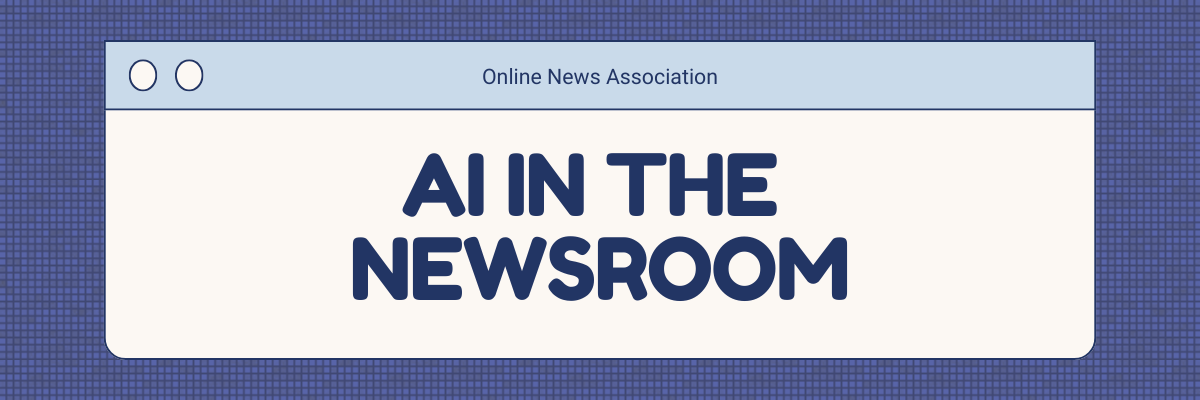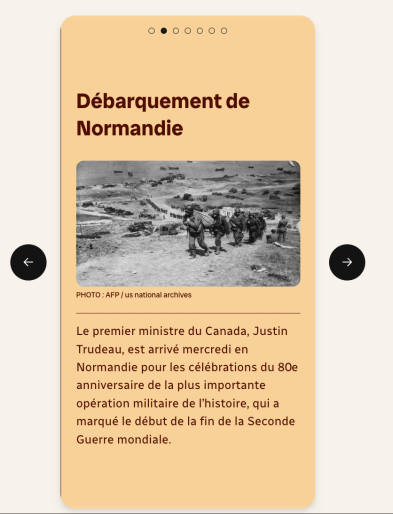Case Study: Building AI Literacy at Canada’s National Public Broadcaster Radio-Canada
Published September 24, 2024

AI in the Newsroom is a series of case studies from the Online News Association (ONA) that highlight specific ways journalists are building and using AI tools.
In September 2023, Radio-Canada launched a comprehensive AI literacy training program aimed at enhancing the newsroom’s understanding and application of AI technologies. This case study delves into the program’s development, implementation, and impact.
Opportunity
Radio-Canada, the French-language arm of Canada’s national public broadcaster, recognized the increasing importance of AI in journalism and sought to equip its newsroom with the skills necessary to leverage these technologies. The primary goals were to demystify AI, foster a culture of experimentation, and integrate AI tools into daily journalistic practices. The initiative targeted a wide range of roles within the newsroom, from editors to camerapeople, with the overarching objective of unlocking AI’s potential for innovation and efficiency in the newsroom and building institutional knowledge on AI.
Solutions
The AI literacy initiative at Radio-Canada was structured into three components:
1. Training Sessions: A foundational three-hour AI training session open to all newsroom staff to provide a solid understanding of AI concepts, ethical considerations, and practical applications. Key areas covered included machine learning, deep learning, generative AI, and effective prompt engineering.
2. Expertise Group: A cross-functional team comprising machine learning developers, analysts, and journalists facilitated bi-weekly meetings to discuss AI developments, brainstorm coverage topics, and share ongoing projects.
3. Experimentation Workshops (Prompt Clinics): Follow-up workshops focused on practical applications. Participants are encouraged to identify specific tasks that AI could assist with and develop concrete tools. These sessions aim to foster creativity and collaboration, allowing journalists to experiment with AI in their daily workflows.
“The goal for this prompt clinic is to identify the tasks on which they want to work and to create value by sharing ideas and developing concrete use cases,” said Florent Daudens, the former Director of News Gathering who began and led the AI literacy initiative.
One significant win that emerged from the Prompt Clinic is the integration of AI into the production workflow of “En Bref,” a feature in their app that provides quick summaries of news stories for both their app and website, greatly enhancing efficiency and productivity.

An example of the En Bref product, which editors now use to create quick, concise summaries of news stories.
Impact
Since the launch of the AI training program, over 100 staff members from various backgrounds across TV, radio, and web at Radio-Canada have participated in the training sessions. The program has successfully shifted newsroom culture towards viewing AI as a “copilot” with a noticeable shift in perceptions of AI, from fear and uncertainty to creativity and possibility.
-
An internal prompts library was created that documents the use cases for generative AI in the newsroom, enabling knowledge sharing and collaboration.
-
Journalists report a deeper understanding of AI’s role and limitations, enriching their reporting capabilities with post-training surveys indicating high satisfaction, with participants feeling empowered to apply AI tools in their work.
-
Journalists are now using AI more effectively in their daily work, from transcription and data extraction to creative applications like generating news quizzes.
-
The “En Bref” product has been prototyped and will be gradually rolled out into the newsroom’s workflow, delivering considerable time savings and improved content adaptation features.
Lessons learned
Several key lessons emerged from the AI literacy initiative at Radio-Canada:
-
Rapid Implementation: Accelerating the rollout of foundational training sessions could have increased initial momentum and engagement.
-
Cross-Functional Collaboration: The success of the expertise group highlighted the importance of involving diverse roles in AI discussions and development.
-
Concrete Use Cases: Practical, task-specific applications of AI proved highly valuable and boosted productivity.
-
Cultural Shift: Emphasizing a culture of experimentation and the acceptance of failure was crucial. “Putting this tool in the hands of journalists is also a way for us to encourage them to experiment and to send the message that they can make mistakes. They have to make mistakes with AI because it’s the starting point to learn,” noted Daudens.
-
Continuous Improvement: Regular updates and feedback loops are essential to refine training content and address emerging AI developments.
The next phase will involve a combination of editorial and technological advancements, with the News department working closely alongside other teams, particularly the Digital department, to implement AI initiatives. Notably, CBC/Radio-Canada adopted a company-wide AI charter last May, and Radio-Canada recently created a position for an AI Editorial Specialist.
AI literacy is crucial to innovating with AI, as it requires upskilling an entire workforce. Radio-Canada’s initiative demonstrates how a structured and comprehensive approach can successfully integrate AI into journalism practices, fostering a culture of experimentation and continuous improvement.
Go deeper
To hear more about the training initiative at Radio-Canada, listen to this episode of Newsroom Robots featuring Florent Daudens, the former Director of News Gathering at Radio-Canada and now Press Lead at Hugging Face.
For insights into AI literacy initiatives from another newsroom, listen to this episode with Alessandro Alviani, the former AI Product Manager at Ippen Media, discussing their approach to AI literacy at the German newsroom.
This resource is part of the AI in the Newsroom series. Read other case studies you might have missed:
- Djinn, an AI-powered Data Journalism Interface
- How Hearst built an AI-powered, Slack-based Tool to Help With Digital Content Production
- Enhancing Fact-Checking with AI at Der Spiegel
- Transforming Workflows with AI at Zamaneh Media
- How Bayerischer Rundfunk Used Modular Journalism to Personalize Radio News Based on Location
- Sweden’s Aftonbladet Built AI-Driven Editorial Tools and an Election Chatbot
- THE CITY’s AI-Powered Coverage Audit and Navigation Tool
- Using AI to Analyze Open-Source Intelligence in Ukraine War Reporting
- How The Times of India Brings Real-Time Personalization to 1,500+ Daily News Stories

